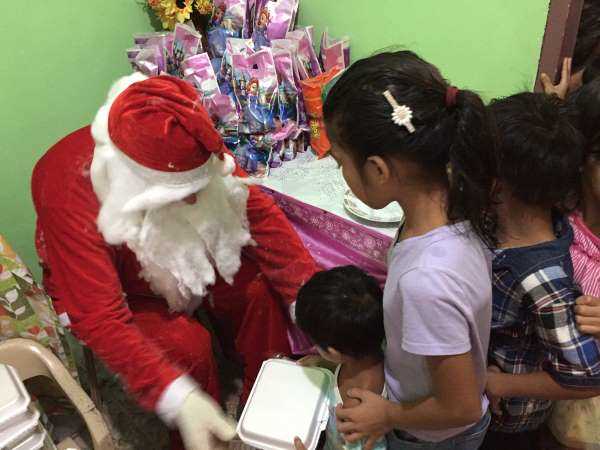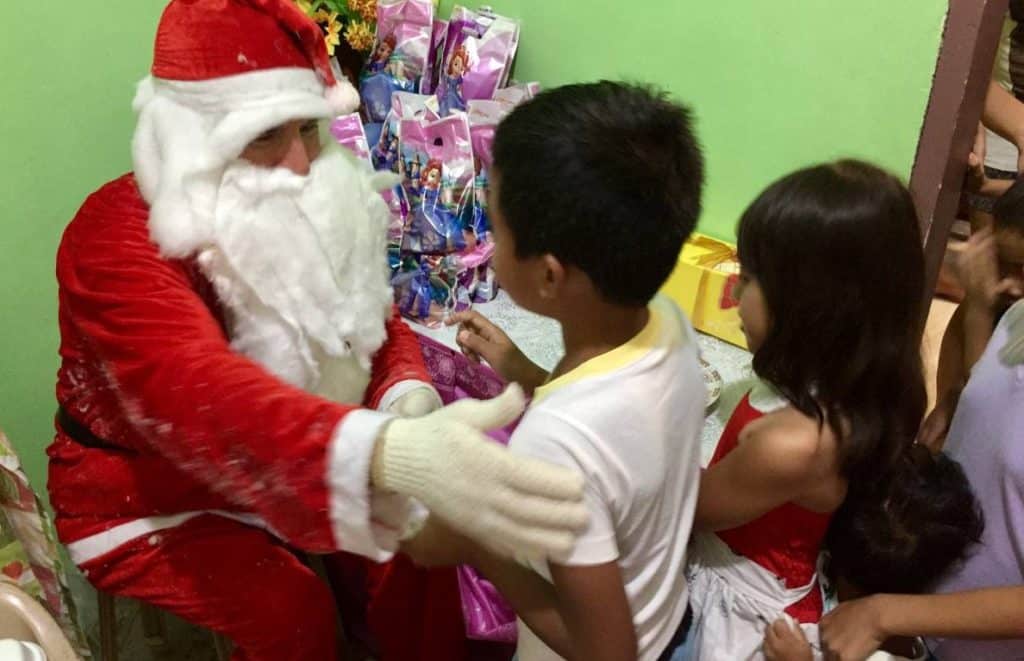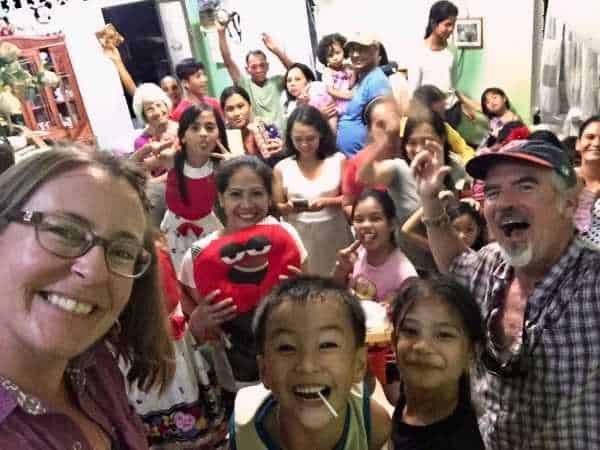Does your ego ever get the better of you? Sometimes, my ego tries to best me. My sense of self-importance nearly ran roughshod over me recently, but instead I learned a valuable cultural travel lesson.
Maybe my experience will help fellow American travelers who feel inclined to “help” locals who, at first glance, appear like they need “help.” But really, it turned out I was the one who needed help.
Cultural travel lesson
An American Christmas belongs in America
We met a delightful couple and quickly became friends. They invited us to a party at their rural home on a nearby mountain. It was their beautiful toddler’s birthday party combined with a Christmas party.
We happily accepted their warm invitation. In conversation it came up that most of the children on the mountain had never seen Santa Claus because the kids had never been inside a mall, or in a mall during Santa’s limited holiday hours.
So I asked where we might get a Santa suit for my husband. As luck would have it, there was an inexpensive getup at our local mall. We bought the suit during the week before Christmas. My heart burst with love for Tedly, who wasn’t wild about playing Santa, but agreed to do it anyway.
My next thought: Surely jolly old St. Nick had to bring a bag of presents! So then we shopped for gifts for the kids on the mountain whose families probably don’t have as much money as we do. All I could think about were the children’s smiles as they opened gifts from Santa.
We had been up to the family’s house on the mountain once before the party, and we estimated there were about a dozen children in the extended family. We bought enough gifts for 12 little piles for each child: crayons and paper or markers and paper, a doll or a car, a slinky or a magic trick kit. The birthday toddler would get a separate birthday present, as well.
A few days before the party, we learned an estimated 70 to 80 kids were expected at the party to see Santa! Word spread the jolly old guy would make an appearance!
As budget travelers, that many toys were not an option. I recounted the situation to my sister, who made a generous offer: she would contribute enough money to get us to 80 small gift piles. My sister has a huge heart, and she and I know how lucky we were as American children on Christmas morning for so many years growing up.
I happily reported my sister’s donation news to Tedly and his mother, who is staying with us and traveling with us in the New Year.
Tedly said he was uncomfortable giving all out all of those gifts, regardless of who bought them. He didn’t feel it was his place. I was confused. Surely he’d want Santa to deliver toys by the sack? Maybe it was just cold feet, I thought. His mom would talk sense into him.
We gave Mom Diane the update, and waited for her reply. Now, for anyone who doesn’t know Tedly’s mom Diane Kortan, you need to know this about her as background for my cultural travel lesson: she is a humble woman; she is observant, intuitive, intelligent, and she is a well-traveled, kind soul.
I waited for Mom’s response. My ego wanted to hear: of course! It’s Christmas! What a gift that we can pass on toys from Santa to these children!
But that’s not what I heard.
Instead, Mom Diane said: maybe it’s not our place to do this – to spread around what might be unwelcome American affluence at their special party.
Ouch! My ego was hurt.
Her advice left me with a lump in my throat. I felt stung. I felt like a child who’s been told NO! for something the child really, really wanted. Deep down, I struggled with whether or not she was right. I mean, what kid wouldn’t want a new doll or toy car or water gun from Santa on Christmas? Growing up, I was a privileged child who expected these items – and more – from Santa.
Outvoted two to one, I declined my sister’s generous offer. Mom Diane, Tedly and I agreed to bring the gifts we had already bought. We would give the bags full of wrapped packets to our friends for the original dozen or so children. Our friends could put the bags aside and distribute the gifts however they saw fit.
Meanwhile, Santa would arrive at the party laughing and waving and HoHoHo-ing and give out candy to all children, and that would be that.
We went to the party — and it was an amazing time without any toy gifts from Santa.
Now, logically, I know gift giving in the American sense is materialistic and shallow. Perhaps it’s simply so ingrained in me that it was my first instinct to provide some type of toy for as many Filipino mountain children as possible. But material gifts were not needed.
Our friends had chocolate goody bags for the children as party favors and other candy as gifts. Our fabulous hostess and friend arranged for Santa to give out meals to the children — meals that were cooked by the women in the family all day prior to the party. All children got a tray of food.
The feast at the party was huge: fish, chicken, veggies, spaghetti, rice — and the main attraction: suckling pig, called “lechon” by Filipinos. I learned that a giant roasted pig is a different sort of wealth than a new dollhouse. And when it’s prepared by family and enjoyed at a large family party, the memory will last decades longer than batteries in a plastic toy.
Santa answered questions about elves and the North Pole. The kids prayed with Santa. Everyone danced to karaoke and ate tons of food. The kids took pictures with Santa, and some adults did, too.







Travel lesson: Acceptance of other Christmas traditions
A typhoon hit the mountain the night of the party – so about half of the kids never made it. But the ones who were able to go, got to see Santa for the first time in their lives. That, alone, is so special.
All of my silly worries about Santa’s “gifts” seemed so damn absurd. And at some point during the night, my ego realized: my American Christmas culture didn’t belong at this party.
I wanted to those children to open presents like I had been able to. In that way, my heart was in the right place. But my ego was not mature enough to step back and accept the invitation for what it was — an invitation as a guest to a party in a foreign country, with a different Christmas culture. It was not an invitation to spread my “American affluence” around.
Mom was right, Tedly was right. And while I hate being wrong, I am mature enough to admit when I make a mistake in judgement.
The right thing to do here was to accept their culture as it is, and not try to impose my idea of Christmas on my new friends. And that was my big cultural travel lesson that happened to come at Christmastime in the Philippines.
Most of the children on that mountain don’t have video games or new bicycles or smartphones. But they have something much more valuable than the capitalistic nature of American Christmases: they have their culture, their families, and a way of life more sustainable and arguably much more soulfully fulfilling than a seasonal gift bag disguised as the spirit of the season.


